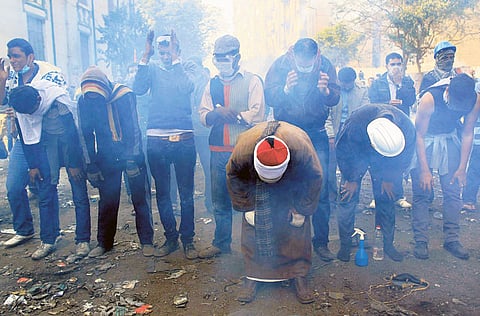Military seeks to harness support with referendum
Tantawi's move aimed at tapping ‘silent majority'

Cairo: In the battle on the streets for control of Egypt, the ruling military council has threatened to deploy a new weapon which could further polarise the country and lead to a tougher crackdown on the protesters demanding an end to army rule.
The generals have suggested a vote.
Yet by holding out the prospect of a referendum on the army's role, Field Marshal Mohammad Hussain Tantawi intends not to speed his departure but to harness support for interim military rule among Egypt's anxious "silent majority", those millions who are not currently protesting in Tahrir Square.
Tantawi did not say when a vote might take place or exactly what the referendum would be on. The idea was widely seen as a tactic to pressure the street activists into recognising they may be in the minority. But with no sign of them giving way, he may be forced to follow through.
"It is very serious and very dangerous," said Hassan Nafa, a political scientist at Cairo University who has been critical of the Supreme Council of the Armed Forces, the group of generals that has ruled since Hosni Mubarak, himself a product of the military, was deposed in February after 30 years in power.
"It means if you don't accept what I am proposing to you, I will go to the people and get a blank cheque for the army to continue to rule the country the way it wants," he said.
For the generals, it would be a bet on Egypt's "silent majority".
It is a gamble they could well win by presenting the people with the spectre of chaos were the army to step back right away, as demanded by those camped out in Tahrir Square.
Beyond the square, a sprawling city centre traffic junction by the Nile, traders hit by the latest protests expressed the kind of sentiment that could be tapped by the generals, who have promised to hand power to a civilian administration by mid-2012.
‘Business is suffering'
"Of course I am with the idea of having a referendum because the people sitting in Tahrir don't represent all Egyptians," said Mohammad Saeed, who works in a foreign exchange bureau.
"Business is suffering. Our work here is affected of course. No tourists, no people pass by," he said.
"We don't know what the people in Tahrir want any more."
Parts of Tantawi's speech on Tuesday appeared aimed at Egyptians like Saeed, who yearn for normality. Tantawi highlighted the damage done to the economy through investment flight, production hold-ups and the depletion of resources.
In his nine-minute address, he also gave some ground to the reform movement, pledging the military would hand power to a civilian president before July — six months or so sooner than promised — and would install a new cabinet in the meantime.



